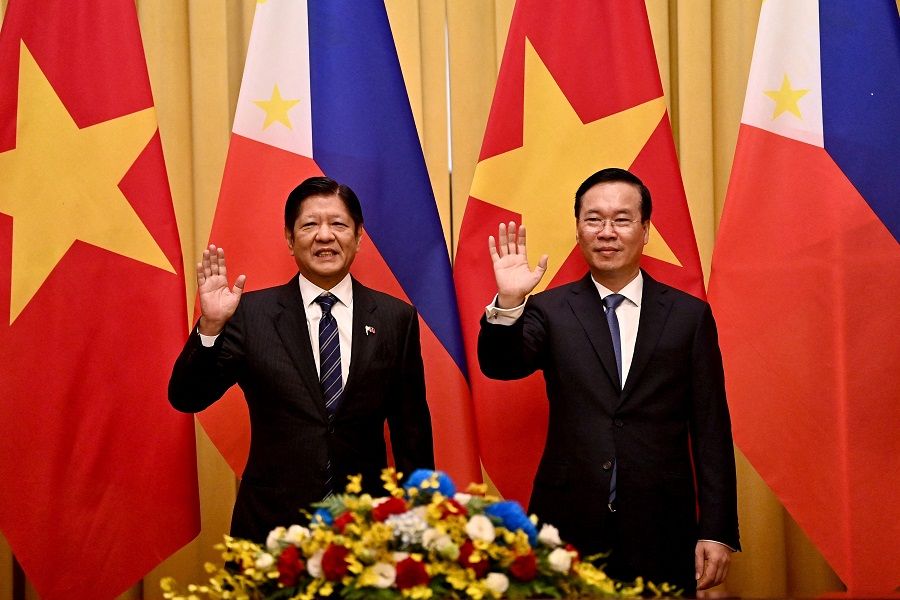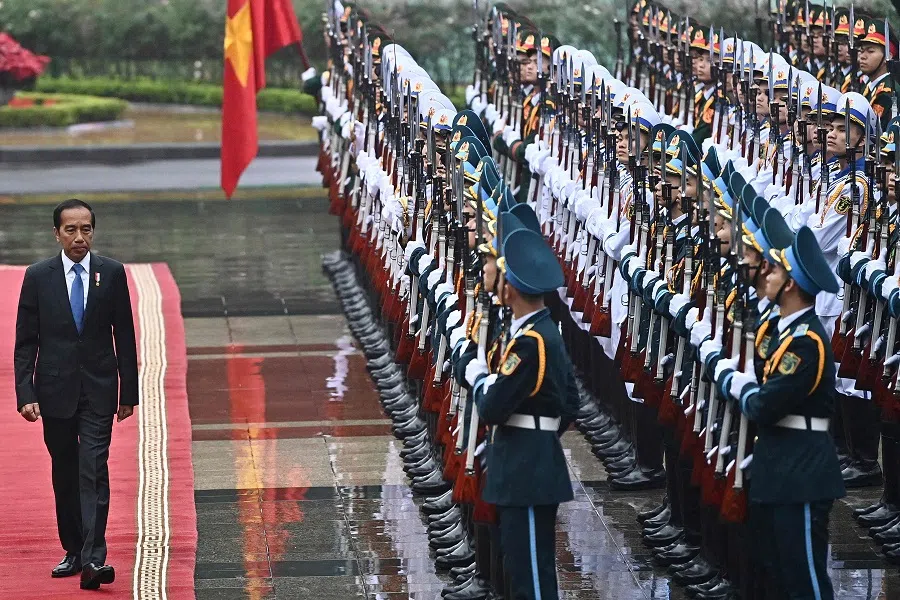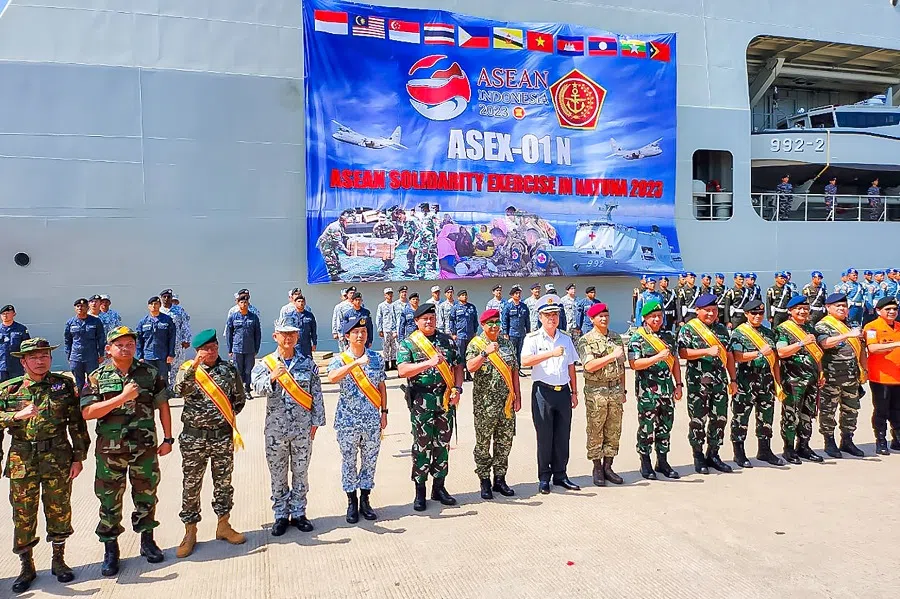Philippine President Marcos Jr's visit to Vietnam: Creating a 'united front' over South China Sea issue?
President Marcos Jr's overtures to Vietnam during his recent visit to Hanoi seem to indicate that ASEAN claimant states are starting to "gang up" on China. But the picture is not so clear-cut, says Chinese academic Peng Nian, when one considers Vietnam's interests and relations with China.

On 29 January, almost two months after the call for a separate South China Sea (SCS) code of conduct (COC) with ASEAN members, Philippine President Marcos Jr initiated his first state visit to Vietnam. Reportedly, both sides signed agreements to prevent untoward incidents in the SCS and to broaden cooperation between their coast guards.
According to Marcos, the accord on maritime cooperation "aims to establish a comprehensive partnership between our coast guards on capacity building, training and personnel and ship exchanges to enhance interoperability operations between our two countries".
Since the Philippines has sought to build a "united front" with the ASEAN claimant states on challenging China's claims in the SCS, these agreements might be considered a good start. The Philippines would, therefore, describe them as "great victories", thus leveraging their ability to garner external and internal support for the Marcos administration.
Giving intra-ASEAN maritime cooperation a boost
Moreover, there is a likelihood of increasing the political will of ASEAN states to promote maritime cooperation. Before Marcos's Vietnam visit, Indonesian President Joko Widodo visited three claimant states, namely, the Philippines, Vietnam, and Brunei, in January 2024, during which defence cooperation, COC consultations, and trade and investment were the top priorities of discussions. In September of last year, Indonesia conducted its first joint military exercises with its ASEAN neighbours in the SCS.
It is clear that the ASEAN states have expanded their maritime cooperation in the wake of rising tensions in the SCS and intensified competition between China and the US. It seems that the ASEAN states are trying to strengthen their joint capabilities and enhance ASEAN countries' centrality in hedging against the security risks of great power rivalry in the region. Given ongoing SCS tensions and China-US confrontations, there might be more maritime cooperation between the ASEAN states after Marcos's state visit to Vietnam.
... the Coast Guard Agreement with the Philippines does not mean that Vietnam stands with the Philippines on the SCS disputes or shows support for Marcos's hawkish SCS policy.

That said, the significance of Marcos's Vietnam visit and the agreements on coast guard cooperation should not be overestimated. In fact, coast guard agreements are common among maritime states, especially among SCS claimant states.
For instance, China has signed a coast guard agreement with Vietnam, and the coast guards of the two countries have conducted several joint patrols in the Gulf of Tonkin. China even signed a memorandum of understanding (MOU) on establishing a joint coast guard committee on maritime cooperation with the Philippine Coast Guard during former President Duterte's first China tour in October 2016.
Vietnam not necessarily standing with the Philippines
More importantly, Vietnam has taken a very cautious stance on maritime cooperation with the Philippines, as the latter has repeatedly provoked China in the SCS.
In November of the previous year, Vietnam did not overtly respond to Marcos's call for a separate COC. Instead, it agreed to build a shared future for humankind with China and avoided escalating tensions in the SCS.
Therefore, the coast guard agreement with the Philippines does not mean that Vietnam stands with the Philippines on the SCS disputes or shows support for Marcos's hawkish SCS policy. It is actually an element of Vietnam's balancing act in the SCS; that is, it is expanding maritime cooperation with all the partners, including the claimant states, to enhance its maritime capability without provoking China.
In addition, the main function of the maritime cooperation agreement is to manage the fishing activities of the two countries, as Vietnamese fishing boats usually enter waters claimed by the Philippines as part of its exclusive economic zone.
Different objectives from the Code of Conduct
Although analysts believed that the top leaders of the Philippines and Vietnam included the COC consultations, no bilateral COC agreement was released during the visit.

The two countries have different focuses on the COC. The Philippines mainly focuses on Spratly Islands (Nansha Islands), while Vietnam prefers to protect its interest on Paracel Islands (Xisha Islands).
Furthermore, the Philippines welcomes the deep involvement of external actors, particularly the US, in the COC consultations process, while Vietnam is worried about the escalated tensions in the SCS, especially those brought about by external actors.
... the visit would not be able to generate joint actions or a "united front" against China.
No 'united front' against China
Even so, Marcos suggested submitting a joint proposal on the limits of the continental shelves of coastal states to the Commission on the Limits of the Continental Shelf (CLCS) at the UN, in which he stated, "The Philippines is willing to work with Vietnam for a joint submission at the appropriate time." However, he did not receive a clear response from Vietnam.
In 2009, Vietnam and Malaysia made a joint submission to the CLCS on "information on the limits of the continental shelf beyond 200 nautical miles from the baselines from which the breadth of the territorial sea is measured in respect of the southern part of the South China Sea". However, they failed to obtain approval from the CLCS due to China's opposition. Since then, there have been no joint submissions.
Given that China has consistently indicated that any form of "ganging up" by Southeast Asian claimants would be considered a hostile act by Beijing and met with strong dissatisfaction, it is unlikely that Vietnam will support the Philippines' proposal for a joint submission to the CLCS.
Overall, Marcos's state visit to Vietnam and the positive outcomes of maritime cooperation could be regarded as successful, but the visit would not be able to generate joint actions or a "united front" against China.




![[Big read] When the Arctic opens, what happens to Singapore?](https://cassette.sphdigital.com.sg/image/thinkchina/da65edebca34645c711c55e83e9877109b3c53847ebb1305573974651df1d13a)
